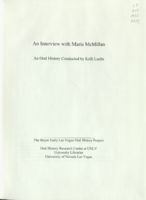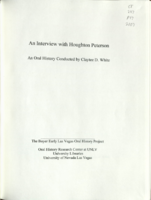Search the Special Collections and Archives Portal
Search Results

Transcript of interview with Jack Cornell by Richard Fesler, February 18, 1979
Date
Archival Collection
Description
On February 18, 1979, Richard Fesler interviewed Jack W. Cornell (born 1918 in Manhattan, Nevada) about his experiences living in Nevada. The two first discuss historical buildings, including the Nye County Courthouse, and Cornell describes his family background and the different locations at which his ancestors lived. Cornell then talks about his experiences as an airplane mechanic for the Army Air Corps during World War II and the different countries he would visit during that time. The two also discuss the effects of the Depression, Cornell’s work in automotive body repair, and his recreational activities. Cornell also describes an experience in which he assisted an air escort for President Roosevelt, and he also describes when he witnessed one of the atomic tests. The interview concludes with Cornell’s thoughts on how the rural area in Manhattan has changed over time.
Text

Transcript of interview with Ralph Denton by K.J. Evans, approximately 1999-2000
Date
Archival Collection
Description
On an unknown date (likely 1999-2000) and time, K.J. Evans interviewed Ralph Denton, an adviser to former Governor Grant Sawyer and political figure in Nevada for many years. Denton first talks about his personal friendship with Sawyer, their education in law school, and his eventual work on campaigning for and working with Sawyer after he became governor. Denton then explains the controversy regarding Denton’s accepting of complimentary services (comps) at hotels. He later describes his work as a Clark County Commissioner and then talks about working as district attorney in Esmeralda County, Nevada. Denton then talks about the influences that led him to be interested in a career of law and later speaks more about working with Grant Sawyer, specifically about serving as his adviser, afterwards providing the argument on why he believes Sawyer was the greatest governor of Nevada. Toward the latter part of the interview, Denton describes his work on improving civil rights and some of the challenges that came with that. The two also discuss how the practice of law has changed over time. To conclude the interview, Denton describes his experience in running for governor and how he would have served as governor if he had been elected.
Text

Transcript of interview with Owen Earl Cox by Mark Milford, March 6, 1981
Date
Archival Collection
Description
On March 6, 1981, Mark Milford interviewed Owen Earl Cox (born 1909 in Bunkerville, Nevada) about his experiences growing up in and working in Nevada. Cox first talks about his early moves to and from Nevada and his work in road construction in the 1930s. He then discusses his work of machinery at the Basic Magnesium Plant and some of his experiences during that time. Cox also talks about his family, the Mormon Church, the growth of population, and the increase in tourism. He later describes managing a store he owned known as Vegas Village and the types and prices of the products that were sold there. The end of the interview involves a discussion of crime, Cox’s hobby of cattle ranching, and his views on the growth of Las Vegas.
Text

Transcript of interview with Clark Crocker by Monica Lehman, March 3, 1978
Date
Archival Collection
Description
On March 3, 1978, Monica Lehman interviewed Clark Crocker (born 1920 in Westfield, Massachusetts) about his experiences while living in Nevada. Crocker first talks about his family and educational background before describing his experiences from going to school in both California and Massachusetts. Crocker then describes what he knows about the building of Hoover Dam and later talks about his career as a teacher and school principal. The two also discuss Crocker’s hobbies and volunteer work, including that for the fire department in Pahrump, and they later discuss Crocker’s experiences as both a frogman and navigator for the United States Navy during World War II. The interview concludes with some of Crocker’s thoughts and philosophies on how curriculum should be structured in schools.
Text

Transcript of interview with Roger Hurley Dudley by Beth McLaren, March 7, 1981
Date
Archival Collection
Description
On March 7, 1981, Elisabeth McLaren interviewed blackjack dealer, Roger H. Dudley (born August 10th, 1940 in Las Vegas, Nevada) in his home. This interview covers Roger’s recollections on growing up in Las Vegas. During the interview they further discuss Roger’s childhood, his parents, grade school, World War II, the atomic testing, the Mesquite Club, the development of the Strip, rodeos, Howard Hughes, Paradise Valley and changes in Las Vegas, Nevada.
Text

Transcript of interview with Marie McMillan by Kelli Luchs, September 15, September 23, October 1, & November 24, 2009
Date
Archival Collection
Description
From an early age, Marie McMillan displayed an adventurous sensibility, a characteristic that is revealed in how life unfolded for her. In this multi-part interview, Marie begins with her birth in 1926 California, and continues with stories of her childhood recollections of the Depression era, her longstanding closeness with Nanny, her maternal grandmother, and memories of Old Bent, her paternal grandfather. She enjoys a flirtatious vitality and attends college for a year. However, as World War II begins to infest the U.S., Marie finds herself falling for a young merchant marine named Duke Daly. They marry, have two children, and live a transient life moving about California and Hawaii as he goes to school, then seeks and finds employment in a postwar economy. By the late 1950s, the Daly household is stressed and begin to split time between California and Las Vegas. Marie holds positions that require security clearance and administrative talents. In 1961, Duke passes away a
Text

Transcript of interview with Houghton Hoot Peterson by Claytee White, May 20, 2010
Date
Archival Collection
Description
Houghton Hoot Peterson played trombone in his high school band in northern Minnesota where he grew up. That same instrument would lead him to be a member of the highly regarded Air Force jazz band called Airmen of Note after enlistment. Then during a short tour at Nellis Air Force base, Hoot decided that the Las Vegas entertainment scene might have career opportunities for him. He moved to Las Vegas in 1962, an era of celebrity performers and tourists who enjoyed the crowds and nightlife. Hoot's point of view was as a musician in the band, most often a Strip relief band. But he also has tales of famous musicians and late night jam sessions. Hoot's career spanned 20 years. Eventually the Las Vegas scene for live musicians began to change. When times got tough for Hoot, he worked as a carpenter and at a music store. In this interview he discusses his fascinating past and offers advice for today's musicians.
Text

Transcript of interview with Stavros Anthony by Claytee White and Stefani Evans, July 24, 2017
Date
Archival Collection
Description
Born of humble beginnings to a sheep farming family in Cyprus, Greece, Stavros Anthony embodies the legacy of the American spirit and ability to reach as far as one can to achieve personal greatness. His family came to the United States in 1955 and moved to Kansas City, Missouri, where his father started working in the restaurant business as a cook until 1967. Moving to Detroit proved to be a benefit for the family, as his father became the executive chef for the Grosse Point Yacht Club, one of the most exclusive clubs in the country. He went from sheep herding, to peeling potatoes, to the executive and afforded his family a typical middle class lifestyle. He graduated from high school in 1975 and attended Wayne State University, earning is B.A. in criminal justice and starting his career in policing with the university’s police department. Upon graduating in 1980, he faced a frozen job industry in Detroit due to a very bad auto recession. He applied for and secured a position as a po
Text

Transcript of interview with Mary and Bill Laub by Stefani Evans and Claytee White, September 15, 2017
Date
Archival Collection
Description
While offering anecdotes on Southwest Gas Company’s early years—including its flirtation with a nuclear bomb and owning a casino; its purchase of a Kingman, Arizona, ranch with an underground salt dome, and its involvement with the formation of Boyd Gaming—this oral history also reveals Bill Jr.’s role in applying his knowledge of natural gas infrastructure to promote extensive education about building codes, infrastructure, and engineered systems. In particular, Bill discusses EduCode, the internationally recognized, week-long building code institute held annually in Las Vegas that originally began more than twenty-five years ago and has since attracted worldwide participation. While Bill does not teach at the institute, he has helped organize the course since its inception and has been a consistent supporter.
Text

Transcript of interview with Steve Riback by Barbara Tabach, December 12, 2017
Date
Archival Collection
Description
Sgt. Steve Riback is a Detective Sergeant for the Las Vegas Metropolitan Police Department. He has been with the police force for nearly twenty years. On the night of the Route 91 Harvest festival shooting, he had just returned home shortly after 10pm. He had been on an overtime assignment at the Golden Knights hockey game at the T-Mobile prior to the shooting. When he was abruptly awaken by a call from his lieutenant, he was oblivious to the time and immediately rushed into action—contacted his squad members and sped to his station in northwest part of the city. He reflects on his overwhelming pride of the police that day, recalling what he heard on his police radio, seeing the rush of police cars being dispatched, and watching a body camera video later. Sgt. Riback’s squad was assigned to Spring Valley Hospital where they worked tirelessly to identify victims, both injured and deceased. His reflections stir the image of medical professionals and police officers urgently fusing together to handle the situation at hand. Riback shares a myriad of emotions, talks about the options available for officers to deal with their personal trauma, and how he explained to his eight-year-old why Daddy was crying. Riback is also known as the Kosher Cop and has authored a book, My Journey Home, about becoming an observant Orthodox Jewish officer and his struggle for the right to wear his beard and a yarmulke while on duty.
Text
